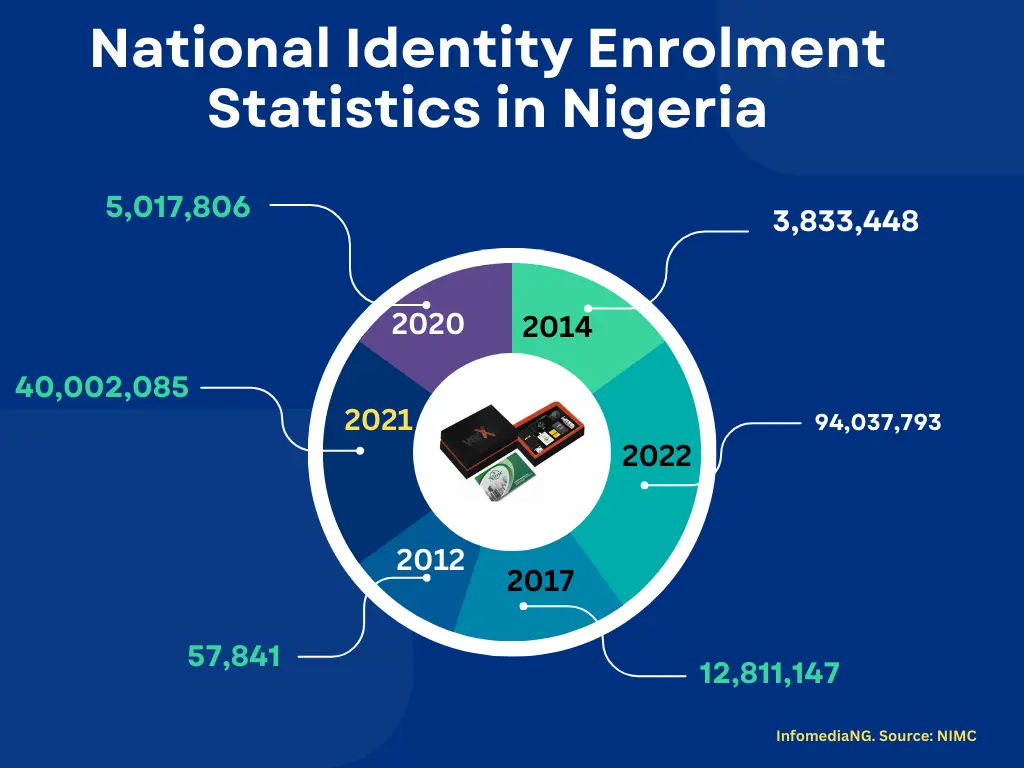Data from the National Identity Management Commission or NIMC shows that 102,390,967 Nigerians now have a National Identification Number or NIN as of August 28, 2023.
For the first time since the national identity registration commenced, it crossed over 100 million – 100,021,186 – in May 2023. The NIN is a means of identification introduced by Nigeria’s government which started in 2007 (other functions of the identity scheme can be found in this article).
National identity enrolment isn’t peculiar to only Nigeria, countries around the world have different ways and means of identifying their citizens and residents in their countries.
Here are the updated statistics of National identity registration in Nigeria since InfomediaNG started tracking the exercise 2012.
What Is The Monthly Enrolment for NIN in 2023?
In July 2023, a total of 101,647,882 NINs had been issued out to Nigerians since the programme began, but between the months of July and August, the commission issued new 743,05 NINs, bringing the number to 102,390,967 at the end of August 2023. It was 95,077,917 in January 2023.
Here is the number of Nigerians with national identity as at August 2023:
- January: 95,077,917 (Female: 41,400,916; Male: 53,677,001)
- February: 96,526,292 (Female: 41,954,338; Male: 54,571,954)
- March: 97,490,355 (Female: 42,260,974; Male: 55,229,381)
- April: 98,708,656 (Female: 42,703,652; Male: 56,005,004)
- May: 100,021,186 (Female: 43,276,096; Male: 56,745,090)
- June: 101,013,279 (Female: 43,674,938; Male: 57,338,341)
- July: 101,647,882 (Female: 43,920,986; Male: 57,726,896)
- August: 102,390,967 (Female: 44,237,951; Male: 58,153,016)
Why the increasing number of registrations?
The surge in the number of registrations is majorly connected to the fact that the government now linked its national identity data to other services provided by the government and private companies.
For instance, NIN is needed to process passports, business registrations, Special Control Unit Against Money Laundering or SCUML certificates etc. Also, linking NIN to SIM cards is now mandatory for old and new phone users.
Also, the number of ‘japa’ has increased in recent times, especially among Nigerians who are in search of greener pastures or who are unhappy about the economic policies of the government and have the financial means to relocate their family to another country they perceive as being better than Nigeria.
Decentralizing the registration process such as having accredited vendors at home and abroad has also helped Nigeria bring its population to its database. So, it’s safe to say the government is making some improvement, though at a slow pace. It plans to achieve 2.3 million enrolments per month.
Let’s check what Nigeria has in its National Identity Number Database from 2012 through 2023
National identity enrolment from 2012 to date
What did the data say in 2012 and now?
- 2012: 57,841
- 2013: 1,147,181
- 2014: 3,833,448
- 2015: 2,202,818
- 2016: 7,430,820
- 2017: 12,811,147
- 2018: 6,083,446
- 2019: 5,836,663
- 2020: 5,017,806
- 2021: 40,002,085 (December 12)
- 2022: 94,037,793
- 2023: 102,390,967 (August 26)
Analysis of the data between 2012 to date
Nigeria experienced its highest NIN registration between 2020 to 2022, enrolment jumped from five million in 2020 to over 40 million before the end of 2021.
What’s responsible for the spike?
On December 9, 2020, the government directed its agency, the Nigerian Communications Commission (NCC), to suspend the activation of new SIM cards to enable it to audit the Subscriber Registration Database and verify that SIMS cards were linked to the National Identification Number.
Because of this directive, thousands of Nigeria thronged mobile telecommunication centres across the country to forcibly get registered so that they would not lose their SIM cards.
Also, Mobile Network Operators (MNOs) (like MTN, GLO, and Airtel) who registered new SIMS without linking them to their customers’ NIN were threatened that they would lose their operating licence.
And number of registrations jumped from 5,017,806 to 40,002,085 by December 12, representing over 600% enrolment compliance.
Again, in December 2020, the government gave mobile networks a two-week ultimatum (December 16, 2020 – December 30, 2020) for all SIM cards to be linked to NIN.
Although the government later extended the ultimatum, it forced Nigerians out of their comfort zone to get their National identification number, pushing the figure from 40,002,085 in 2021 to 94,037,793 by the end of 2022.
State with the highest NIN registration
As usual, the two most populated states Lagos and Kano take the lead with 11,170,187 and 9,078,714 enrolment respectively while Kaduna is third on the table with 6,344,932, at the end of August 2023.
- Lagos: 11,170,187
- Kano: 9,078,714
- Kaduna: 6,344,932
- Ogun: 4,323,434
- Oyo: 3,969,970
- Katsina: 3,506,323
- FCT, Abuja: 3,465,827
- Rivers: 3,072,948
- Bauchi: 2,731,814
- Delta: 2,725,428
State with lowest NIN enrolment
Bayelsa with the lowest population in Nigeria has the lowest National identity registration with 642,233, followed by Ebonyi (818,173) and Ekiti (1,013,169).
From the bottom 10 are:
- Bayelsa: 642,233
- Ebonyi: 818,173
- Ekiti: 1,013,169
- Cross River: 1,170,280
- Taraba: 1,478,925
- Yobe: 1,624,719
- Enugu: 1,646,789
- Kogi: 1,710,567
- Akwa Ibom: 1,736,981
- Imo: 1,738,209
NOTE:
The number of registrations in the states doesn’t really mean they are indigenes of the state, this figure simply means the number of registrations by citizens resident in the states.

